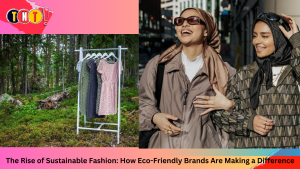
The rise of sustainable fashion is transforming the industry by prioritizing ethical practices, reducing waste, and promoting a more conscious approach to fashion. The fashion industry has long been criticized for its environmental impact, but a new wave of eco-friendly brands is leading the charge toward sustainability. Here’s how these eco-friendly brands are making a difference:
Reducing Environmental Impact
Sustainable fashion brands are committed to minimizing their environmental footprint. This includes using eco-friendly materials, such as organic cotton, recycled fabrics, and biodegradable dyes. By opting for sustainable resources, these brands help reduce pollution, conserve water, and lower carbon emissions.
Ethical Production Practices
Many sustainable fashion brands focus on ethical production, ensuring that their workers are paid fair wages and work in safe conditions. This commitment to ethical labor practices challenges the fast fashion model, which often relies on exploitative labor in developing countries.
Promoting Circular Fashion
Circular fashion is a key component of sustainability, emphasizing the importance of recycling, reusing, and upcycling clothing. Eco-friendly brands are embracing this concept by offering take-back programs, creating products designed for longevity, and encouraging customers to repair or repurpose old garments.
Transparency and Accountability
Transparency is a cornerstone of sustainable fashion. Brands are increasingly providing detailed information about their supply chains, materials, and production processes. This transparency allows consumers to make informed choices and hold brands accountable for their environmental and social impact.
Redefining Consumer Behavior
Sustainable fashion is shifting consumer behavior by promoting mindful purchasing decisions. Instead of buying into fast fashion trends, consumers are encouraged to invest in high-quality, timeless pieces that last longer and have a lower environmental impact. This shift towards slow fashion challenges the throwaway culture of the past.
Innovation in Materials
Innovation is at the heart of sustainable fashion, with brands experimenting with new materials and technologies. From plant-based leather alternatives to fabrics made from recycled ocean plastic, these innovations are pushing the boundaries of what sustainable fashion can achieve.
Influencing the Broader Industry
The success of sustainable fashion brands is influencing the broader fashion industry to adopt more eco-friendly practices. Major fashion houses and fast fashion retailers are beginning to incorporate sustainable initiatives, such as using organic materials or launching eco-conscious collections.
Empowering Consumers
Sustainable fashion empowers consumers to make a positive impact through their choices. By supporting eco-friendly brands, consumers can contribute to reducing waste, lowering carbon emissions, and promoting ethical labor practices. This empowerment fosters a sense of responsibility and connection to the global community.
Addressing Overproduction and Waste
Overproduction is a significant issue in the fashion industry, leading to massive amounts of waste. Sustainable brands tackle this problem by producing smaller, more intentional collections, often using pre-order systems to avoid excess inventory. This approach helps reduce waste and encourages more thoughtful consumption.
Educating the Public
Sustainable fashion brands are also playing a crucial role in educating the public about the environmental and social impacts of their clothing choices. Through marketing campaigns, collaborations, and social media, these brands are raising awareness and inspiring a new generation of conscious consumers.
The rise of sustainable fashion is transforming the industry and paving the way for a more eco-friendly future. By focusing on ethical practices, innovation, and consumer empowerment, these brands are making a significant difference in reducing the environmental and social impact of fashion. As more consumers embrace sustainability, the movement will continue to grow, driving positive change in the industry and beyond.



